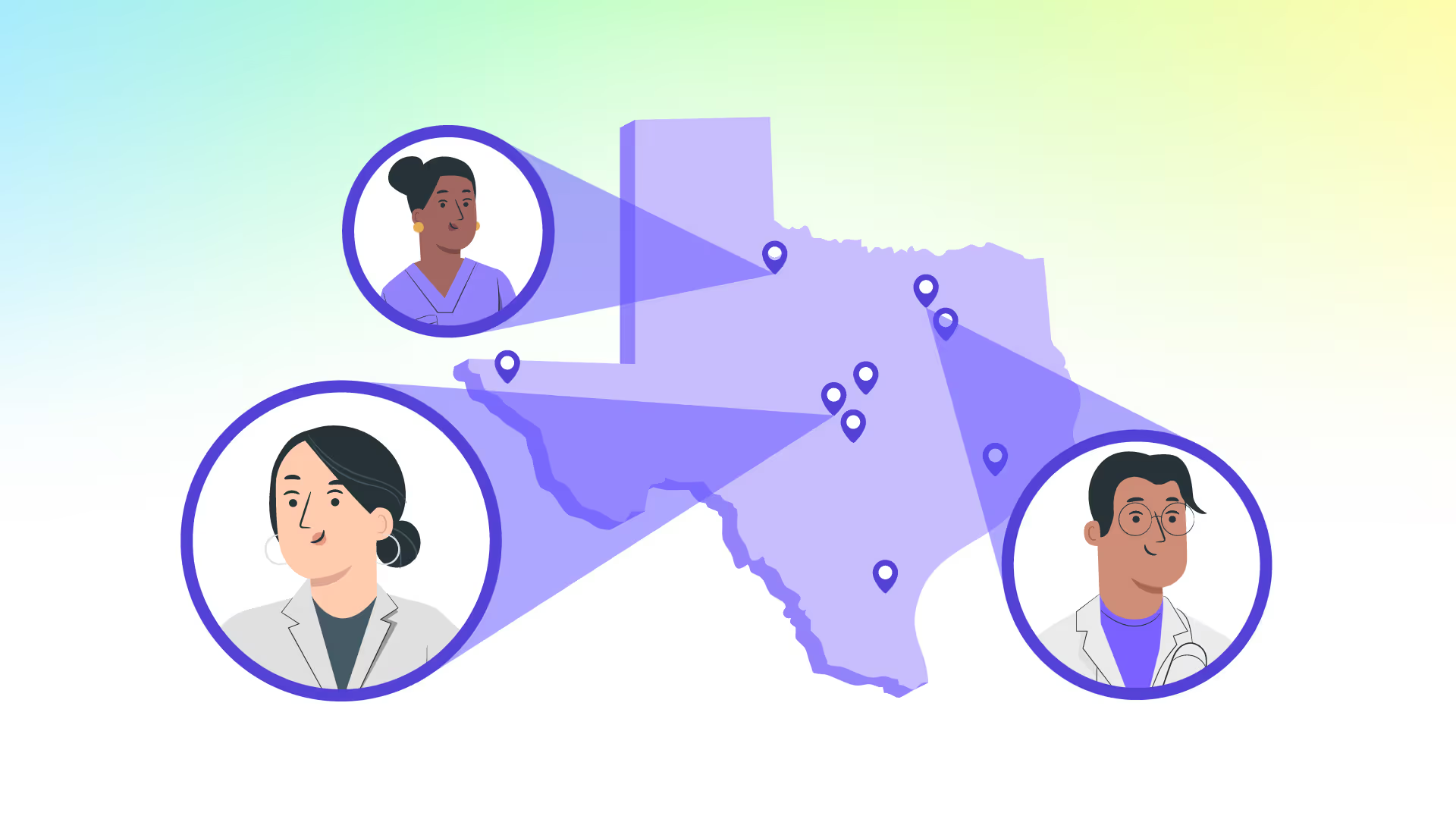The role of nurse practitioners (NPs) in the United States has been growing significantly, with over 355,000 NPs now serving communities across the country. Their impact is particularly profound in rural areas, where healthcare access often faces unique challenges.
Despite this growth, the U.S. Bureau of Labor Statistics projects an annual demand for 31,900 NPs, highlighting the critical need for these advanced practice registered nurses.
So, why are nurse practitioners so important in rural areas? How do they contribute to improving health outcomes and promoting health in these underserved regions?
This post will explore three key reasons why rural healthcare relies heavily on nurse practitioners. We'll delve into how NPs fill crucial service gaps, overcome geographic barriers to care, and play a vital role in addressing the unique health issues faced by rural populations.
By understanding the significance of nurse practitioners in rural settings, we can better appreciate their contribution to the healthcare system and their impact on patient care in rural America.
Versatility and Autonomy: The Dynamic Role of NPs in Rural Healthcare
Nurse practitioners (NPs) are pivotal in addressing the unique healthcare challenges faced by rural communities. Their versatility and autonomy make them indispensable in areas where resources are limited and primary care shortages are prevalent.
A nationwide study utilizing claims and electronic health record (EHR) data from 2017 illuminates the extent of NP autonomy in rural settings. The findings reveal that rural NPs often manage their own patient panels and operate more independently than their urban counterparts. This autonomy extends to prescriptive authority, with many rural NPs having the ability to prescribe Schedule II controlled substances, underscoring their expanded role in patient care.
The scope of practice for nurse practitioners in rural areas is remarkably broad. They not only provide essential primary care services but also:
- Staff emergency departments, offering critical care in areas far from major medical centers
- Manage chronic conditions prevalent in rural populations, such as high blood pressure and diabetes
- Interpret diagnostic tests and develop treatment plans, often without immediate physician oversight
- Promote health and wellness through patient education and preventive care
This wide-ranging responsibility contributes to high job satisfaction among rural NPs. Their ability to practice to the full extent of their training allows them to make a significant impact on patient outcomes and overall community health.
Moreover, the nurse practitioner's role in rural healthcare extends beyond clinical practice. Many NPs in rural settings take on leadership roles, advocating for policy changes that can improve healthcare access and quality in their communities. Their unique position at the intersection of nursing and advanced practice allows them to bridge gaps in the healthcare system, particularly in underserved areas where they may be the primary or sole healthcare provider.
As we continue to explore the importance of nurse practitioners in rural areas, it becomes clear that their versatility and autonomy are not just beneficial but essential to the health and well-being of rural America.
Bridging the Gap: NPs Addressing Rural Health Professional Shortages
Rural America, home to over 61 million residents—approximately 18% of the U.S. population—faces unique healthcare challenges. These rural communities often comprise older and economically disadvantaged individuals who experience both educational and health inequities. The impact of these disparities is stark: rural residents have a life expectancy that is, on average, two years shorter than their urban counterparts.
The healthcare landscape in rural areas is further complicated by significant provider shortages:
- More than 80 million Americans, many in rural regions, reside in designated Health Professional Shortage Areas (HPSAs).
- The healthcare sector anticipates a shortfall exceeding 120,000 providers by 2030.
- Perhaps most alarming, only 11% of physicians practice in rural settings, leaving vast areas underserved.
These statistics underscore the critical role that nurse practitioners play in rural healthcare. As we've discussed, NPs bring versatility and autonomy to these underserved areas. But beyond that, they're actively working to close the healthcare access gap that plagues rural America.

Remarkably, about 18% of all U.S. nurse practitioners are committed to serving in rural zones. This dedication is crucial, as it means NPs are not just filling a void—they're offering care specifically tailored to the unique needs of rural populations.
Empowering through Education: Preparing NPs for Rural Practice

The unique demands of rural healthcare require nurse practitioners to be exceptionally well-prepared. Given the autonomy and breadth of responsibilities we've discussed, educational programs that specifically prepare NPs for rural practice are not just beneficial—they're essential.
These specialized educational programs go beyond standard NP curricula to address the distinct challenges of rural healthcare:
- Comprehensive Clinical Skills: Rural NPs often practice at the full extent of their licensure, requiring a broad and deep skill set. Programs focus on developing expertise in areas like chronic disease management, emergency care, and preventive health services.
- Independent Practice Readiness: With less physician oversight in rural settings, NPs must be prepared to make complex clinical decisions independently. Educational programs emphasize critical thinking and autonomous practice skills.
- Cultural Competence: Understanding the unique cultural aspects of rural communities is vital. Programs often include coursework on rural sociology and cultural sensitivity.
- Public Health and Community Engagement: Rural NPs often take on leadership roles in community health. Education in public health principles and community engagement strategies is therefore crucial.
Recognizing these needs, forward-thinking academic institutions are revising their curricula. For instance, Washburn University has developed a program centered on preparing NPs for rural practice through its advanced educational nursing workforce grant. This initiative aims to equip NPs with the specific skills and knowledge needed to thrive in rural healthcare settings.
Moreover, continuing education programs are being developed to support practicing NPs who wish to transition to rural settings. These programs often focus on areas like expanding scope of practice, managing with limited resources, and addressing rural-specific health issues such as agricultural health and safety.
By providing this targeted education and support, these programs strengthen NPs' capabilities in rural settings. They ensure that nurse practitioners are not only clinically competent but also prepared for the unique challenges and opportunities that come with rural practice.
Conclusion
As we've examined throughout this article, nurse practitioners are indeed the cornerstone of healthcare in rural America. Their impact extends far beyond merely filling gaps in the healthcare system; they are actively reshaping and improving healthcare delivery in underserved communities.
The unique combination of clinical expertise, autonomy, and community engagement that NPs bring to rural settings is unparalleled. They not only provide essential primary care services but also act as leaders, advocates, and innovators in addressing the complex health challenges faced by rural populations.
Looking ahead, the significance of nurse practitioners in rural areas is set to grow even further. As healthcare continues to evolve, NPs will likely play an increasingly crucial role in:
- Advancing telehealth initiatives to further bridge geographic barriers
- Implementing population health strategies tailored to rural communities
- Driving policy changes to improve healthcare access and quality in rural settings
- Mentoring the next generation of rural healthcare providers
For aspiring nurse practitioners, the rural healthcare landscape offers a unique opportunity to make a profound impact. The challenges are significant, but so are the rewards—both in terms of professional satisfaction and tangible improvements in community health outcomes.
As we continue to address the healthcare disparities between rural and urban areas, the contributions of nurse practitioners will be invaluable. Their ability to provide high-quality, comprehensive care in resource-limited settings is not just filling a need – it's transforming rural healthcare.
As the healthcare landscape changes, one thing remains clear: nurse practitioners will be at the forefront, ensuring that rural communities receive the quality care they deserve.
Find a preceptor who cares with NPHub
Book a rotation.webp)








.webp)


.webp)



%20(3)%20(2).svg)
.webp)